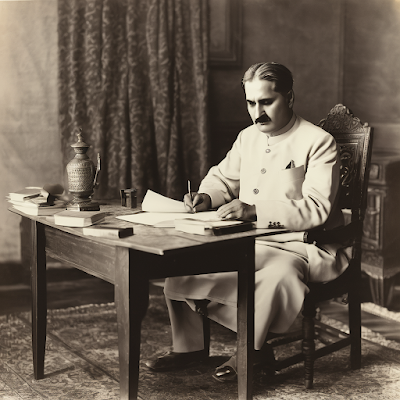Biography of Allama Iqbal - Pakistan's Famous Poet and Philosopher
The Life and Works of Allama Muhammad Iqbal, Pakistan's National Poet
 Allama Muhammad Iqbal is referred to as one of the outstanding poets of Urdu literature and the country-wide poet of Pakistan. Born in Sialkot, British India (now in Pakistan) in 1877, Iqbal changed into a profound philosopher who delved deeply into the troubles of social reform, politics, and spirituality via his inspiring poetry. Some of his famous works highlighting his messages include Asrar-i-Khudi, Rams-i-Bikhodi, Bang-i-Dara, Bal-i-Jabreel and Armaghan-i-Hijaz.
Allama Muhammad Iqbal is referred to as one of the outstanding poets of Urdu literature and the country-wide poet of Pakistan. Born in Sialkot, British India (now in Pakistan) in 1877, Iqbal changed into a profound philosopher who delved deeply into the troubles of social reform, politics, and spirituality via his inspiring poetry. Some of his famous works highlighting his messages include Asrar-i-Khudi, Rams-i-Bikhodi, Bang-i-Dara, Bal-i-Jabreel and Armaghan-i-Hijaz.
Iqbal's poetry reflects his imagination and prescient of an unbiased Muslim country carved out of India for the Muslim population of South Asia. Pieces like "Sare Jahan Se Ush Hindustan Hamara" and "Trana Milli" evoked nationalist sentiments amongst Indian Muslims. He provided his political thoughts through masterpieces that blended both Eastern and Western philosophies through an Islamic framework. Iqbal emphasized self-reliance and autonomy for the Muslims of the subcontinent at a time after they were a minority under British rule.
Frequently Asked Questions:
- When did Allama Iqbal stay?
Allama Iqbal lived from 1877 to 1938.
- In which language did Iqbal write?
Iqbal wrote most of his poetry in Urdu, but he additionally knew Persian and Arabic.
- Which was the most well-known series of Iqbal's poems?
One of Iqbal's most famous works changed into Asrar Khudi which outlines his philosophy of "Khudi" or Self.
Conclusion:
Allama Iqbal's poetry evokes and shapes the country-wide identification of Pakistan. Through his tremendous writings, he articulated a powerful vision for Muslim empowerment and autonomy that contributed to the creation of an unbiased kingdom for the Muslims of South Asia. Iqbal is considered the various maximum influential poets and thinkers of the subcontinent.





.png)


Post a Comment